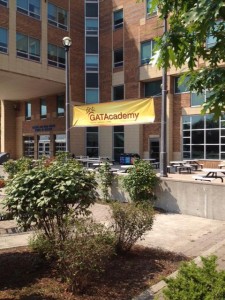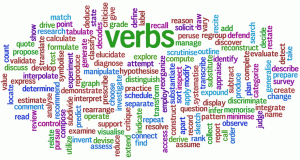At this year’s GATAcademy 2015, Alex Gayowsky and Marissa Reaume spoke to participants about the importance of keeping a feedback word bank: a collection of words you use when formulating comments for students’ assignments.
Over time, as your experiences in teaching grow and multiply, you’ll begin to notice that there are certain words and phrases that you keep coming back to in your comments to students. These are the words you rely on to tell students what they are doing well and how they can improve. Your feedback word bank collects these points – whether on a post-it note or in a formal document – to make it easy for you to find an appropriate comment for a student’s work quickly.
What Makes Good Feedback Good
Research tells us a few things about what constitutes effective feedback. Marianne Stenger of Edutopia collected scholarly research from a variety of sources within higher education that suggests effective feedback is specific, timely, goal-oriented, is clearly for the purpose of personal growth, and involves learners in the process.
The University of Waterloo’s Centre for Teaching Excellence also suggests that, as much as possible, good feedback offers continued support. In other words: good feedback is something you can follow up on with the student.
Columbia University’s Graduate School of Arts & Sciences Teaching Center offer their own tips. Aside from referring back to the grading criteria, the Center also suggests making suggestions for how to rephrase main ideas.
Building Your Feedback Word Bank
Start by reviewing your feedback to students on past assignments. To that end, keeping track of your feedback is a good idea not just for building your word bank, but also for keeping track of what you want to follow up on with students. For the purpose of your word bank, however, look for comments you tend to make a lot. Keep in mind that this practice will tend to be assignment-specific, especially as it relates to different concepts that might be covered at different points of a course.
Of course, while you’re building your list of commonly used evaluative words and phrases, you might find yourself craving more range in your critical voice. Expanding your feedback vocabulary takes time, but it’s worth exploring other people’s vocabularies and finding synonyms for the words you already use, like this list from the University of Michigan Business School. Just be careful to stay away from subjective words like “good” and “bad” – aim more for “effective” and “unsupported.”
Keeping a few stock examples of effective responses to an assignment to include in comments can also make your feedback more specific, so remember to ask students who perform particularly well on an assignment this time around if you can use their work as an example for future classes. The same goes for core and/or threshold concepts: common phrases that explain (and re-explain) the key concepts students were meant to address are another important component of an effective feedback word bank.
Some teachers even go so far as to build phrase and sentence response banks. Robin Neal discusses the merits of using Microsoft Word macros to insert general feedback phrases into student work. Neal keeps a database of the feedback comments he makes most often on student essays. Then he uses shortcuts to insert those comments into student papers.
You can also start building your feedback repository by thinking in terms of levels of achievement. In short, what types of words do you tend to use to describe high achievement? Which words do you use to describe low achievement? Try breaking these phrases down into a table, like so:
| Level of Achievement | Phrases |
| Highest Achievement (A Range; 80 – 100%) |
beyond; advanced; original use of; highly detailed; “thesis engages with key concepts of the argument in innovative way”; “report provides detailed critical analysis and clearly explains the results, as well as their implications” |
| High Achievement (B Range; 70 – 80%) |
considerable; detailed; clear connections; effective; “thesis presents argument using balanced evidence”; “report includes all necessary elements and provides some critical analysis” |
| Adequate Achievement (C Range; 60-70%) |
required elements; necessary; “thesis presents realistic argument”; “report addresses objectives, but more analysis is necessary to understand the results” |
| Low Achievement (D Range; 50 – 60%) |
minimal; underdeveloped elements; “thesis does not fit with the argument”; “lacking one or more elements required of the report” |
| Lowest Achievement (F Range; 0 – 50%) |
missing; incomplete; “no thesis present”; “data not presented” |
If this table looks a little like a rubric, there’s a good reason for that, too.
Where Does Good Feedback Come From?
If we’re taking proper course alignment and inter-rater reliability into account, than feedback words will naturally tend to borrow from your rubric. When your feedback word bank is structured effectively, you should see a lot of overlap between the words you use in your rubric or assignment description and the comments you are leaving for students.
As this guide from Curtin University of Technology suggests, rubrics are themselves a form a feedback. Depending on how it’s structured, a rubric can provide examples of feedback according to different levels of achievement. When a rubric is used properly, instructors then add to those exemplars with specific insights about a student’s work.
What Do You Keep In Your Word Bank?
Tell us what phrases you find yourself coming back to again and again in the comment section below.
The GATAcademy 2015 event program is now available online!
We’ve collected resources from a number of workshops for the expanded version of this year’s program. Missed a workshop on the day? There’s a good chance you’ll find resources or slides from that session here. Missed GATAcademy entirely? Now you can get an overview of what you missed.
Find resources from…
- Intercultural Relations: In Class and Across Campus
- Introducing Blackboard
- Active Learning
- Effective Explanations
- Creating and Delivering Effective Feedback
- Presenting Effective Labs
View and download the GATAcademy 2015 Program here.
A good friend of mine once wrote about the importance of hope in pedagogy. Essentially, his article went like this: hope is a widely accepted “good idea,” is a social force for positive change, includes a sense of responsibility, and, for educators, a readiness to invest ourselves in the ongoing struggle to create possibilities for students and ourselves where it seemed none existed before.
Where I’m going with all this is that I want you all to hope in Fall 2015. I want you all to embrace the opportunities you are being given – whether they include leading a lab, processing scantrons, or working in a lab – and see them for the possibilities they can create.
GATAcademy is always circled on my calendar because it’s a focal point for possibilities. GATAcademy is where possibilities are born. GATAcademy is where, two weeks ago, 300 people gathered to talk about concrete possibilities for better teaching and learning.
I hope you face challenges that test your limits.
I hope you witness meaningful student engagement.
I hope you are provided opportunities to lead, create, and manage.
I hope you find balance in your life.
I hope you make discoveries.
This is the part where I tell you it’s okay to be afraid, anxious, or even apathetic. The threat of the unknown looms large in the minds of GAs/TAs. What will my supervisor be like? How will students react to me? Will I find time for my work and my studies?
Not everyone has the teaching itch. Some GAs/TAs are thrust into teaching roles when all they are looking for is a job that helps to pay tuition. My advice to these individuals is twofold:
- Remember what it was like to be in your students’ position, and use that understanding to motivate yourself to support their learning to the best of your ability.
- Keep stock of all of the skills you are developing as a GA/TA that could apply to any other job. Presentation, people management, time management, and critical reasoning skills are all transferable skills that you will develop as a GA/TA and apply in future roles.
In the end, what I want you to remember is that personal and professional development are intrinsically important. Whether you plan to work in the field you will be assisting in or not, this is an opportunity to build character. Successfully managing a GA/TA position shows that you are responsible, reliable, and able to multitask. What career doesn’t require those things?
More importantly, get excited about learning! Yes, I mean it. Think about all of the “Ah hah” moments and lightbulb/”Eureka!”‘s you will be a part of this semester. Some of those moments will come easy, others will take some hard work from all involved. Whatever the case, when they happen, they will be gloriously rewarding.
Now that you’re a few weeks into the semester, and as deadlines and responsibilities become real and weighty, it’s okay to be wavering in enthusiasm. It’s also alright to be low on energy and thinking about how your own studies are important and how you can’t spend all of your time on your assistantship. But when those feelings grow, remember your role in the creation of endless possibilities in the classroom, remember…

References
Jacobs, D. (2012) What’s hope got to do with it?: Theorizing hope in education. In Eds. Lynn Worsham and Gary Olson Education as civic engagement: Toward a more democratic society. New York: Palgrave. Retrieved from http://www.jaconlinejournal.com/archives/vol25.4/jacobs-hope.pdf




Recent Comments